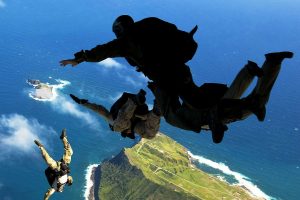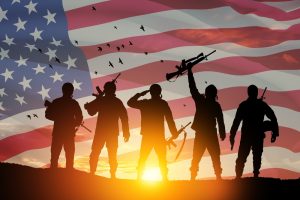When you think of special forces, your mind might immediately jump to the Navy SEALs or the Army’s Green Berets. But did you know that the Air Force also has its own elite units? This article will explore the special forces within the Air Force, highlighting their qualifications, missions, and how they compare to their well-known counterparts like the Navy SEALs.

Understanding Air Force Special Forces
The Air Force Special Forces, officially known as Air Force Special Operations Forces (AFSOF), play a critical role in military operations around the world. They are highly trained to perform specialized missions that are vital to the success of the U.S. military. These units are part of the Air Force Special Operations Command (AFSOC), which is the special operations component of the United States Air Force.
The Role of AFSOF in Global Operations
AFSOF units are deployed in various theaters worldwide, providing indispensable support for both conventional and unconventional military operations. Their role extends beyond combat, often involving strategic reconnaissance and humanitarian missions. The integration of AFSOF into joint operations ensures that air power is effectively utilized, enhancing the overall capability of the U.S. military.
Historical Development of AFSOF
AFSOF’s history traces back to World War II, with the establishment of units designed to conduct specialized air operations. Over the decades, they have evolved to meet the changing demands of warfare, incorporating advanced technology and tactics. The evolution of AFSOF reflects the broader changes in military strategy, emphasizing flexibility and rapid response capabilities.
AFSOC: The Command Behind the Forces
Air Force Special Operations Command (AFSOC) is responsible for organizing, training, and equipping AFSOF units. AFSOC’s mission is to provide highly trained, rapidly deployable airmen who can conduct a wide range of operations. This command structure ensures that AFSOF units are always ready to support U.S. and allied objectives.
Key Units in Air Force Special Operations
AFSOC is composed of several specialized units, each with unique capabilities and missions. Some of the most notable ones include:
Pararescue Jumpers (PJs)
Pararescue Jumpers, or PJs, are known for their motto “That Others May Live,” reflecting their commitment to saving lives in combat zones. They undergo some of the most rigorous medical and survival training in the military. PJs are the only Department of Defense specialty specifically trained and equipped to conduct conventional or unconventional rescue operations, often venturing into hostile environments to retrieve injured soldiers and civilians.
Combat Controllers (CCTs)
Combat Controllers are FAA-certified air traffic controllers with advanced combat training. Their expertise is crucial in establishing airfields and managing air traffic in remote or contested areas. CCTs often operate alongside other special forces, providing critical air support coordination and ensuring the safety of air operations in dynamic environments.
Tactical Air Control Party (TACP)
The Tactical Air Control Party is integral to joint operations, responsible for calling in airstrikes and coordinating air support for ground forces. TACPs are equipped with advanced communication systems and possess in-depth knowledge of air operations, allowing them to effectively manage the battlefield from an aerial perspective. Their role is vital in ensuring the precision and effectiveness of airstrikes.
Special Reconnaissance (SR)
Special Reconnaissance operators, formerly known as Special Operations Weather Technicians, play a key role in collecting and analyzing environmental data. They provide crucial intelligence on battlefield conditions, helping commanders make informed decisions. SR operators are trained to operate independently in diverse environments, gathering information that can significantly impact the success of military operations.
Air Force Special Forces Qualifications and Training
The path to becoming an Air Force Special Forces operator is challenging and requires immense dedication and resilience. Here’s a breakdown of the qualifications and training involved:
Basic Qualifications
To qualify for Air Force Special Forces, candidates must meet specific requirements:
- Age and Citizenship: Typically, candidates must be between 17 and 39 years old and be U.S. citizens. Age waivers may be considered on a case-by-case basis, depending on the individual’s qualifications and experience.
- Physical Fitness: Candidates must pass a rigorous physical fitness test that includes swimming, running, push-ups, sit-ups, and pull-ups. The standards are designed to ensure candidates have the physical endurance and strength required for demanding missions.
- ASVAB Score and Security Clearance: A minimum Armed Services Vocational Aptitude Battery (ASVAB) score is required, varying slightly depending on the specific AFSOF career field. Additionally, candidates must qualify for a security clearance, which involves a thorough background check.
Training Pipeline
The training pipeline for Air Force Special Forces is extensive and demanding. Here’s a glimpse of what it entails:
- Initial Training: Candidates start with Basic Military Training (BMT) and the Special Warfare Preparatory Course, which are designed to enhance their physical and mental toughness. These foundational courses set the stage for more specialized training, emphasizing teamwork, discipline, and resilience.
- Advanced Training: After initial training, candidates enter more specialized courses, such as the Pararescue Indoctrination Course, Combat Control School, or TACP Apprentice Course, depending on their chosen career field. These courses are intensive and cover a wide range of skills, from medical techniques to air traffic control.
- On-the-Job Training: Once specialized training is complete, operators continue to develop their skills through on-the-job training and real-world mission experiences. This phase is crucial for honing practical skills and gaining valuable experience in dynamic operational environments.
Continuous Development and Specialization
AFSOF operators engage in ongoing training and professional development to maintain their proficiency. They may pursue additional certifications and attend advanced courses to refine their skills. Continuous development ensures that operators are always prepared to meet the evolving challenges of modern warfare.
Air Force Special Forces Missions
Air Force Special Forces are deployed worldwide, conducting a wide range of missions in support of U.S. military objectives. Some of their primary missions include:
Search and Rescue
AFSOF units like Pararescue Jumpers are renowned for their search and rescue capabilities. They operate in hostile environments to recover downed aircrew members and isolated personnel. These missions often involve coordination with other military branches and international partners, underscoring the importance of collaboration in rescue efforts.
Direct Action
AFSOF operators are trained to conduct direct action missions, including raids, ambushes, and assaults, to neutralize high-value targets and disrupt enemy operations. These missions require precise planning and execution, with operators often working in small, highly skilled teams to achieve their objectives.
Reconnaissance and Surveillance
Special Reconnaissance operators gather intelligence in hostile environments, providing critical information to commanders for decision-making. Their work is essential for understanding enemy movements and capabilities, enabling informed strategic planning. The intelligence gathered can significantly impact the outcome of military campaigns.

Humanitarian Assistance
Air Force Special Forces often participate in humanitarian missions, providing disaster relief and medical support in response to natural disasters and crises. Their ability to rapidly deploy and operate in challenging conditions makes them valuable assets in humanitarian operations. These missions highlight the versatility and adaptability of AFSOF units.
Navy SEALs vs. Air Force Special Forces
While both the Navy SEALs and Air Force Special Forces are elite units, there are distinct differences in their roles and missions. Here’s a brief comparison:
Training and Selection
- Navy SEALs: Known for their grueling Basic Underwater Demolition/SEAL (BUD/S) training, which emphasizes physical and mental endurance. BUD/S is notorious for its demanding nature, pushing candidates to their limits through intense physical challenges and mental stress.
- Air Force Special Forces: Training focuses on specialized skills such as air traffic control, medical treatment, and environmental reconnaissance. The selection process emphasizes technical expertise and the ability to operate in various environments, reflecting the diverse roles of AFSOF units.
Mission Focus
- Navy SEALs: Primarily conduct maritime operations, including sea, air, and land missions. Their missions often involve direct action and special reconnaissance, leveraging their expertise in amphibious warfare.
- Air Force Special Forces: Specializes in air operations, search and rescue, and providing air support to ground forces. Their focus on airpower integration and support roles complements the capabilities of other special operations forces.
Deployment and Operations
- Navy SEALs: Often involved in high-profile direct action missions, such as counter-terrorism operations. Their ability to operate in diverse environments makes them versatile assets in global military campaigns.
- Air Force Special Forces: Typically support broader military operations, with an emphasis on airpower and coordination. Their contributions are essential in ensuring the success of joint operations and enhancing the effectiveness of U.S. military efforts.
Conclusion
Air Force Special Forces play a critical role in the success of U.S. military operations worldwide. With their unique skills and specialized training, they complement other special operations forces, like the Navy SEALs, by providing essential support in air operations, search and rescue, and reconnaissance. Whether operating in combat zones or providing humanitarian assistance, Air Force Special Forces is a vital component of the U.S. military’s capabilities.
Understanding the diverse roles and missions of Air Force Special Forces helps appreciate the dedication and expertise required to be part of these elite units. Their contributions ensure that the Air Force remains a formidable force in global military operations. The integration of AFSOF into joint operations underscores the importance of collaboration and adaptability in achieving military objectives and maintaining global security.
